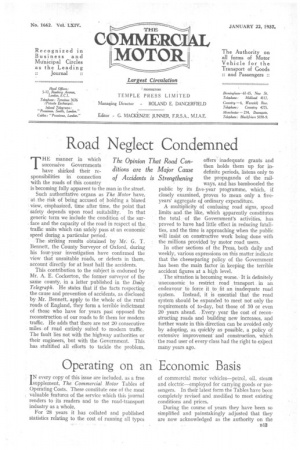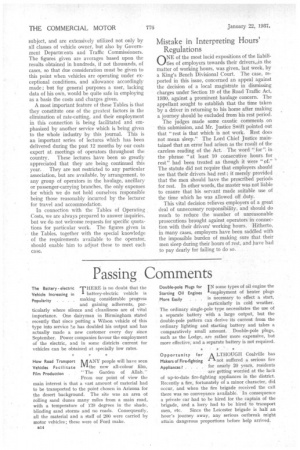Operating on an Economic Basis
Page 23

Page 24

If you've noticed an error in this article please click here to report it so we can fix it.
IIsT every copy of this issue are included, as a free supplement, The Commercial Motor Tables of Operating Costs. These constitute one of the most valuable features of the service which this journal renders to its readers and to the road-transport industry as a whole.
For 28 years it has collated and published statistics relating to the cost of running all types of commercial motor vehicles—petrol, oil, steam and electric—employed for carrying goods or passengers. In their latest form the Tables have been completely revised and modified to meet existing conditions and prices.
During the course of years they have been so simplified and painstakingly adjusted that they are now acknowledged as the authority on the B13 subject, and are extensively utilized not only by all classes of vehicle owner, but also by Government Departments and Traffic Commissioners. The figures given are averages based upon the results obtained in hundreds, if not thousands, of cases, so that due consideration must be given to this point when vehicles are operating under exceptional conditions, and allowance accordingly made ; but for general purposes a user, lacking data of his own. would be quite safe in employing as a basis the costs and charges given.
A most important feature of these Tables is that they constitute one of the greatest factors in the elimination of rate-cutting, and their employment in this connection is being facilitated and emphasized by another service which is being given to the whole industry by this journal. This is an important series of lectures which has been delivered during the past 12 months by our costs expert at. meetings of operators throughout the country. These lectures have been so greatly appreciated that they are being continued this year. They are not restricted to any particular association, but are available, by arrangement, to any group of operators in the haulage, ancillary or passenger-carrying branches, the only expenses for which we do not hold ourselves responsible being those reasonably incurred by the lecturer for travel and accommodation.
In connection with the Tables of Operating Costs, we are always prepared to answer inquiries, but we do not welcome requests for specific quotations for particular work. The figures given in the Tables, together with the special knowledge of the requirements available to the operator, should enable him to adjust these to meet each case.
Mistake in Interpreting Hours Regulations
ONE of the most lucid expositions of the liabilities of employers towards their drivers,in the matter of working hours, was given, last week, by a King's Bench Divisional Court. The case, reported in this issue, concerned an appeal against the decision of a local magistrate in dismissing charges under Section 10 of the Road Traffic Act, 1930, against a prominent haulage concern. The appellant sought to establish that the time taken by a driver in returning to his home after making a journey should be excluded from his rest period.
The judges made some caustic comments on this submission, and Mr. Justice Swift pointed out that "rest is that which is not work. Rest does not mean sleep." The Lord Chief Justice maintained that an error had arisen as the result of the careless reading of the Act. The word "for ". in the phrase "at least 10 consecutive hours for rest" had been treated as though it were The statute did not require that employers should see that their drivers had rest ; it merely provided that the men should have the prescribed periods for rest. In other words, the master was not liable to ensure that his servant made suitable use of the time which he was allowed off duty.
This vital decision relieves employers of a great deal of unnecessary responsibility, and should do much to reduce the number of unreasonable prosecutions brought against operators in connection with their drivers' working hours. Hitherto, in many cases, employers have been saddled with the impossible burden of making sure that their men sleep during their hours of rest, and have had to pay dearly for failing to do so.
















































































































